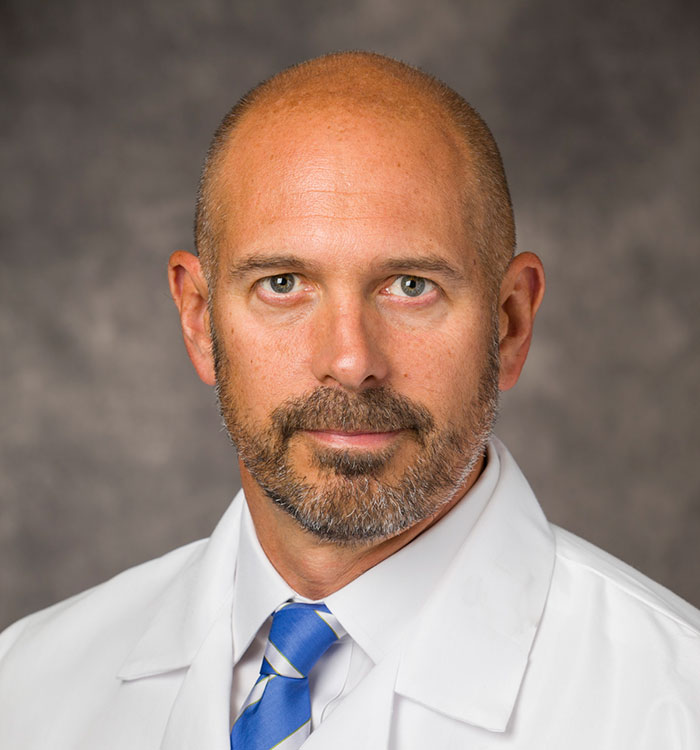Maximizing Quality in Surgery at University Hospitals
December 08, 2021
David Dietz, MD, a recent “Dinner with the Doc” honoree, is helping develop a new systemwide surgery quality improvement endeavor, the UH Surgery Network
UH Clinical Update | December 2021
Developing a systemwide, standardized approach is an integral component of us providing high-value care for patients. In surgery at University Hospitals, this is taking the form of the UH Surgery Network.
 David Dietz, MD
David Dietz, MD“The goal of establishing that network is to improve a lot of quality metrics, in terms of patient experience and the value of the surgical care we provide,” says Dr. Dietz. “It’s part of aligning with the new strategy that Dr. Megerian has unveiled – one of UH’s key differentiators is improving the quality of care while reducing costs.”
As Dr. Dietz explains, UH is continuing to move away from the ‘silo-style’ in surgery that the system once had, not just within sub-specialties, but within each hospital.
“We are taking more of a systemwide approach to care, so when we see a patient in surgery, we know the best way to utilize all that we have as a health system,” says Dr. Dietz, whose specialty is colorectal surgery, but who has been tapped with guiding this comprehensive shift in other types of surgery at UH.
Recently, he and Peter Pronovost, MD, PhD, UH Chief Quality and Transformation Officer, co-authored a paper on this topic for the New England Journal of Medicine’s Catalyst section. It summarizes the holistic approach UH is taking to eliminating defects in surgical care; it also offers a framework for creating centers of excellence to eliminate those defects.
Other departments currently part of the UH Surgery Network include vascular, cardiac, trauma, acute care, thoracic and surgical oncology.
Defects in healthcare are common at nearly all medical centers, everywhere, and Dr. Dietz defines defects as behaviors, based on known evidence, that needlessly reduce the quality of care and patient experience or add to the annual total costs of care.
“We are now entering a new era in medicine and surgery in which the focus will be elevated from the quality of care to its value,” he said. “High-value healthcare is achieved when excellent outcomes, including patient experience, are achieved at reasonable costs.”
“As surgery accounts for nearly half of all Medicare spending, surgeons will have a critical role in this journey.”
Dr. Pronovost estimates the U.S. healthcare system spends $1.4 trillion annually—one-third of healthcare costs — on defects.
That is why UH is emphasizing the elimination of defects, by taking a new approach – in this case, to surgery.
“When we see a patient who will have surgery, we think of things like site of care – is it better for the patient to be in a community hospital close to home, or will this be a more complex surgery that requires particular expertise offered at one of our other hospitals?,” says Dr. Dietz. “But we also standardize some aspects, such as pre-surgical evaluation, risk assessment, perioperative antibiotics – those are things for which we eliminate variability as much as possible and follow clinical practice guidelines.”
Another aspect is enhancing the patient’s recovery, which can reduce the length of stay and the possibility of readmission. “We can do things like get patients on an immune nutrition supplement, do early ambulation, minimize narcotics, doing minimally invasive procedures when possible,” he says. “We try to set those expectations, to get them discharged to home, with home care support. It’s a different mindset.”
And, Dr. Dietz notes, reducing variability doesn’t mean every single time. Ultimately, it depends on the individual patient and his or her condition. “You are never going to eliminate all variability, and you don’t want to.
“After all, there is an art to medicine.”
Congratulations to Dr. Dietz on his “Dinner with the Doc” honor.
To nominate a UH physician caregiver for this award, please visit https://uhcommunity.uhhospitals.org/News/Documents/Cliff_Appreciates_Dinner_w_Doc_Nomination_Form-_FINAL.pdf.


